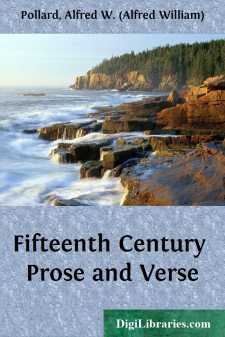Categories
- Antiques & Collectibles 13
- Architecture 36
- Art 48
- Bibles 22
- Biography & Autobiography 813
- Body, Mind & Spirit 142
- Business & Economics 28
- Children's Books 17
- Children's Fiction 14
- Computers 4
- Cooking 94
- Crafts & Hobbies 4
- Drama 346
- Education 46
- Family & Relationships 57
- Fiction 11829
- Games 19
- Gardening 17
- Health & Fitness 34
- History 1377
- House & Home 1
- Humor 147
- Juvenile Fiction 1873
- Juvenile Nonfiction 202
- Language Arts & Disciplines 88
- Law 16
- Literary Collections 686
- Literary Criticism 179
- Mathematics 13
- Medical 41
- Music 40
- Nature 179
- Non-Classifiable 1768
- Performing Arts 7
- Periodicals 1453
- Philosophy 64
- Photography 2
- Poetry 896
- Political Science 203
- Psychology 42
- Reference 154
- Religion 513
- Science 126
- Self-Help 84
- Social Science 81
- Sports & Recreation 34
- Study Aids 3
- Technology & Engineering 59
- Transportation 23
- Travel 463
- True Crime 29
Fifteenth Century Prose and Verse
Description:
Excerpt
INTRODUCTION
In the world of politics and statecraft a nation which has once begun to decline seldom, perhaps never, recovers itself. There are too many other dogs about for the bone which has once been relinquished to be resumed later on. It is luck, indeed, if there are any decent scraps to be found on the platter when it is revisited. In the world of literature and thought the dogs are better bred, showing each other new hunting-grounds, and by example and precept often helping to restore a famished comrade to sleekness and vigour. Political conditions may not be gainsaid. A nation which has once lost its ideals cannot again produce a fresh, strong, and manly literature. But the possibilities of literature remain immense, and we cannot foretell in what country it may not revive and win fresh triumphs. Hence it is that while the political fortunes of a nation seem to move mainly along the three straight lines of ascent, enjoyment, and fall, its literary fortunes express themselves, when we try to generalise, in a series of curves, alternate rises and declines, which may be repeated again and again. In English literature out of the unknown past rose the Anglo-Saxon lyric and epic, Deor's Complaint, Beowulf, and the poems of Cædmon and Cynewulf. From the death-like sleep of our language which followed the Norman Conquest rose the heights of thirteenth-century romance. From the dull poetic pedantries of the age which succeeded Chaucer rose the glittering pinnacles of Shakespeare and his fellows. From the coldness and shallowness of the eighteenth century rose the rich and varied tableland of whose occupants Burns was one of the first and Tennyson and Browning perhaps the last. No other literature has shown such recuperative power, a thought full of hope and consolation in these days, for those who can take pleasure in the anticipated joys of their great-grandchildren.
If this philosophising be thought dull, we have only repaid popular estimates in their own coin; for these sweeping generalisations, which condemn whole centuries as periods of depression, have been largely made for us by popular opinion, and like all generalisations, they have to be very considerably whittled down as soon as we descend to particulars. On a nearer view we find that the curves of literary progress have not been rolled smooth by any steamroller, but that the great chain of hills is connected by numberless ridges, some of which are already rising, long ere others have touched the plain. A pleasant book by an American professor (the History of Romanticism in the Eighteenth Century, by Henry A. Beers) has helped to draw attention to many of these rising ridges of romance in the century which most people connect only with the name of Pope; and I hope in these few pages to show that the fifteenth century, of which we are so contemptuous, was at least not all flat country.
For the poor esteem into which this period has fallen we must lay some of the blame at the door of the literary historians who have, until recent days, placed the English Mandeville nearly half a century too early, postponed the consideration of the dramatic productions till they reached the middle of the sixteenth century, when they gave a meagre summary of 'earlier attempts,' and chronicled the industry of translators, which had been in full swing ever since about 1380, as a special feature of the sixteenth century, helping thus to account for the great Elizabethan outburst of original work. No poor period of literature was ever more mercilessly or wantonly plundered to enrich its prosperous neighbours on either side; and having thus credited to other generations all its little claims to distinction, our literary historians fixed their glance sternly on the court poetry, which is its weakest feature, and made the case of Hoccleve and Lydgate more pitiful than it need be by cruelly comparing them with Chaucer. To be inconvenient to historians is not perhaps of itself a mark of greatness, but Chaucer's professed lovers may take pleasure in observing how largely he shares this characteristic with Shakespeare himself. To give each of them a separate chapter is but a respectful subterfuge, thinly concealing how unconscionably these two sudden elevations interfere with that orderly progression which the historian loves. It would be much easier to tell the story of the Elizabethan-Jacobean drama from rise to fall if Shakespeare could be left out of it; and if there had been no Chaucer, how gentle, how almost mathematical, would have been the progression from the Cursor Mundi and the Handlyng Synne to Gower's Confessio Amantis, from Gower to Lydgate and Hoccleve, and from Lydgate and Hoccleve to Stephen Hawes!...


